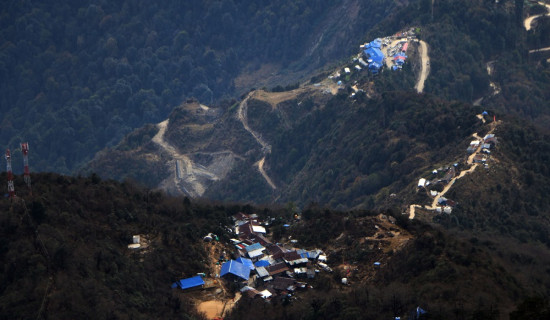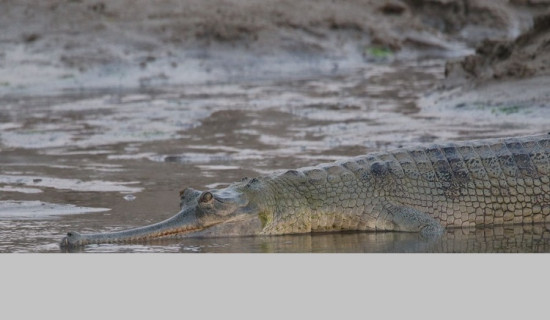- Monday, 3 February 2025
Commercialisation saves wetlands in Morang, harms in Kailali
BY HARI PRASAD KOIRALA,ABINASH CHAUDHARY,Urlabari/ Dhangadhi, Feb. 3: As winter begins, the wetlands of Morang are increasingly crowded. Specifically, the Betana wetland in Belbari Municipality-4 of Morang district has been attracting internal tourists, on holidays and Saturdays. It's not just a spot for picnics, various general assemblies, workshops and seminars are also held at the wetland.
The Betana wetland is the most visited and crowded tourist destination in Morang. Located along the East-West Mahendra Highway, the area gets so packed on holidays that there is barely room to step. It spans 11 hectares within the community forest that covers 174.91 hectares, with a 7-hectare pond area.
Experts say this area has become an attractive destination as rare bird species from Siberia migrate here during winter. Another significant attraction is the presence of rare turtle species in the wetland, which is protected by the Betana Community Forest User Committee. It is also home to two rare species of Betana plants.
According to the president of the Betana Community Forest User Committee, Shambhu Bhattarai, turtles weighing over 100 kilograms can easily be spotted here. Betana is recognised as a breeding centre for rare turtle species.
The wetlands also host various species of fish, animals and plants, further enhancing its appeal. Recently, wild animals rescued and brought to the area are being protected, giving the wetland the feel of a mini zoo. He said that species such as Nilgai, various monkeys, squirrels, wild cats, snakes, pythons, Chinese rats, rabbits, bats and other animals are being conserved in the wetland.
To develop the wetland as a tourist destination, sculptures of various species of animals and plants have been placed with the help of environmental beautification experts, giving the area a distinct identity.
The water in the wetland irrigates around 1,000 bighas of land year-round. In 2000, a water-user group was formed and farmers have been using the water for irrigation while contributing to the wetland's conservation.
For the protection of the wetland, a fence has been installed around the area. A few years ago, after the Betana Festival was organised, a boat was placed in Betana Pond, which has now become a major source of income.
According to the wetland’s data, 51,100 tourists have visited Betana and purchased tickets at Rs. 50 per person from the beginning of the current fiscal year until Saturday, generating approximately Rs. 2.55 million. This data does not include discounts given to children under 10 years, senior citizens over 70 years, local users, elected representatives, media personnel and consumer cardholders. Additionally, Rs. 124,000 has been collected from parking motorcycles (6,200 bikes), Rs. 32,650 from 653 small vehicles and Rs. 5,800 from 58 buses. Likewise, bicycle parking generated Rs. 1,400, picnic fees contributed Rs. 38,000 and boat operations brought in Rs. 386,550 rupees, totalling an income of Rs. 3.14 million from Betana wetland.
However, stakeholders in the Kailali district have claimed that the commercialisation of wetlands has been gradually deteriorating their naturalness. In Kailali district, local governments have granted contracts for all natural ponds and wetlands in their respective municipalities. In these contracted natural ponds, contractors have used bulldozers indiscriminately to create artificial ponds, where they are farming non-native fish species for profit.
Jhumadevi Chaudhary, president of the Federation of Community Forest Users Sudurpashchim Province, said that the wetlands can no longer be called wetlands in the district. “Wetland is defined as ecosystems where water saturates the soil for extended periods, creating conditions for unique vegetation and wildlife. It is vital for all creatures on Earth, including humans,” she said. “Given their importance in biodiversity, wetlands are being rapidly destroyed.”
According to Chaudhary, after municipalities leased out these important wetland areas, contractors have been using them for their gain. They have built artificial ponds and are farming non-native fish species, which has led to the decline of native fish species. "These days, it's very hard to find water-dwelling species like snails, crabs and various native fish species," she said. "By draining the wetlands and farming non-native fish, native species are disappearing."
Although local governments have been leasing out natural ponds and wetlands to increase revenue, it is not clear that the funds generated are being spent on wetland conservation or management. Conservationists argue that local and provincial governments have not invested anything in the protection and management of wetlands.
The natural ponds and wetlands within the important forest area of Basanta Corridor in Kailali have been leased out for fish farming by the municipalities. These ponds have been turned into artificial fish farming ponds, with millions of rupees in revenue generated from the leases. However, the wetland areas have been destroyed. Conservationists like Bijayraj Shrestha state that many wetland areas in Kailali, including the Purena Pond, have been lost due to human activity. "The large ponds, including Purena, which were once home to Sarus cranes, no longer exist," he said.
















-original-thumb.jpg)